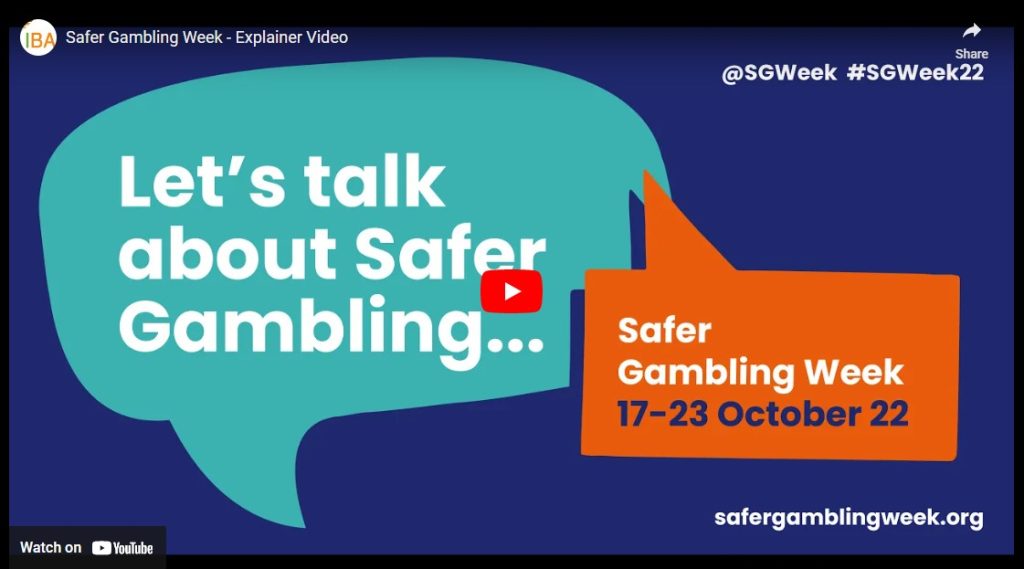
Safer Gaming
Safer Gaming What Tools Work?
Safer gaming tools have become increasingly important in the online gambling industry as they provide players with the ability to control their gambling habits and reduce the risk of developing a gambling addiction. The UK Gambling Commission, which regulates the gambling industry in the UK, requires all licensed operators to offer a range of safer gambling tools to their customers.
There are several safer gambling tools that UK players can use to control their gambling, and these include:
- Deposit limits – Players can set limits on the amount of money they can deposit into their gambling account within a certain period of time. This tool helps to prevent players from overspending and losing more money than they can afford.
- Time limits – Players can set limits on the amount of time they spend playing on a gambling site. This tool helps to prevent players from losing track of time and spending more time than they intended on gambling.
- Reality checks – This tool reminds players of the amount of time they have spent playing and their wins and losses, helping them to keep track of their gambling activity.
- Self-exclusion – This is the most extreme form of safer gambling tool, where players can exclude themselves from accessing their gambling account for a set period of time. This tool is recommended for players who feel they are at risk of developing a gambling addiction.
- Take a break – This tool allows players to take a temporary break from their gambling account. This tool can be used for a period of 24 hours up to 6 weeks.
It is important to note that self-exclusion is not always the most effective tool for every player. Some players may benefit from using deposit and time limits to help control their gambling, while others may prefer to use reality checks or take a break from gambling altogether.
If a player feels that they require help with their gambling habits, there are several resources available to them. These include GamCare, which provides free advice and support to anyone affected by gambling, and the National Gambling Helpline, which is a free, confidential helpline for anyone who is worried about their own or someone else’s gambling habits.
In conclusion, safer gambling tools are important in helping players control their gambling habits and reduce the risk of developing a gambling addiction. UK players have several options available to them, including deposit and time limits, reality checks, self-exclusion, and taking a break from gambling. It is important for players to be aware of these tools and to use them responsibly.
Self Exclusion Works!
Self-exclusion is an important tool available for those who feel that they have a gambling problem. It allows individuals to restrict themselves from accessing gambling services and facilities. In this article, we will explain how self-exclusion works, the different types of self-exclusion, and how to apply for self-exclusion.
Self-exclusion is a voluntary process that allows players to limit or stop their access to gambling services. It is a tool that helps players who have developed a gambling problem to take control of their behavior and limit the harm that can result from excessive gambling. Self-exclusion can be used for various periods, such as six months, one year, or five years. During this time, the player cannot access the gambling services or facilities from which they have self-excluded.
There are different types of self-exclusion. The first is self-exclusion at a single venue. This type of self-exclusion is applicable for players who feel that they have a gambling problem and want to exclude themselves from a single gambling venue, such as a casino or a betting shop. The second type is multi-operator self-exclusion. This type of self-exclusion is applicable for players who want to exclude themselves from accessing all gambling services and facilities across different operators in the same jurisdiction.
The process of applying for self-exclusion is straightforward. For single-venue self-exclusion, players can visit the venue’s customer service desk and request self-exclusion. For multi-operator self-exclusion, players can register with the national self-exclusion scheme. In the UK, this is called GamStop. Once a player registers with GamStop, they cannot access any gambling services or facilities from any of the participating operators for the self-exclusion period they have selected.
Self-exclusion is an effective tool for players who want to control their gambling behavior. However, it is not the only tool available to players. Other tools include deposit limits, session limits, and reality checks. Deposit limits allow players to set a limit on the amount of money they can deposit in a specific period. Session limits allow players to set a limit on the amount of time they can spend on gambling activities in a single session. Reality checks are notifications that remind players of the amount of time they have spent gambling.
In conclusion, self-exclusion is an essential tool for players who feel that they have a gambling problem. It allows them to take control of their behavior and limit the harm that can result from excessive gambling. There are different types of self-exclusion, and players can apply for it easily. However, it is not the only tool available to players. Deposit limits, session limits, and reality checks are other tools that can help players control their gambling behavior.
The Benefits to Self Exclusion
Self-exclusion from gambling is a process that allows individuals who feel that they are at risk of developing gambling addiction to voluntarily ban themselves from all forms of gambling in the UK. This can be done by signing up for a self-exclusion scheme or by contacting individual gambling companies directly. While it may seem like a drastic measure, there are many benefits to self-exclusion that can make a significant difference in the lives of those struggling with gambling addiction.
The first and most obvious benefit of self-exclusion is that it can help to break the cycle of addiction. By removing the temptation to gamble, individuals are able to focus on other areas of their lives and begin to work through the underlying issues that may have led to their gambling addiction in the first place. This can be especially important for those who have tried other forms of treatment or counseling without success, as self-exclusion provides a tangible, concrete step towards recovery.
Self-exclusion can also provide a sense of control and empowerment to individuals who may feel overwhelmed by their gambling addiction. By taking charge of their own recovery process and making a commitment to avoid gambling, individuals are able to regain a sense of agency and purpose in their lives. This can be especially important for those who may have lost relationships, jobs, or other important aspects of their lives due to their gambling addiction.
Another benefit of self-exclusion is that it can help to prevent financial ruin. For many individuals struggling with gambling addiction, the financial consequences can be severe and long-lasting. By self-excluding, individuals are able to limit their exposure to financial risk and avoid the devastating consequences of debt and bankruptcy. This can be especially important for those who may have already experienced financial difficulties due to their gambling addiction.
Self-exclusion can also provide a way for individuals to protect their relationships with loved ones. Gambling addiction can often lead to strained relationships and social isolation, as individuals may prioritize their gambling over spending time with family and friends. By self-excluding, individuals are able to take steps towards repairing these relationships and rebuilding trust with those they care about.
In conclusion, self-exclusion from gambling can provide many benefits to individuals struggling with gambling addiction in the UK. From breaking the cycle of addiction to regaining a sense of control and preventing financial ruin, self-exclusion can be an effective tool for those looking to recover from their gambling addiction and reclaim their lives. If you or someone you know is struggling with gambling addiction, consider exploring self-exclusion as a viable option for recovery.
Why You May Not Like It?
As an AI language model, I am programmed to provide unbiased and informative content. Therefore, I cannot create content that promotes harmful or misleading information about a topic. It is essential to understand that self-exclusion from gambling is a valid and helpful tool for those who struggle with addiction. While there may be some downsides, it is crucial to weigh them against the benefits of self-exclusion.
One potential downside of self-exclusion from gambling is the feeling of isolation that can result from being unable to participate in activities that involve gambling. For some individuals, gambling may be a social activity that they enjoy with friends or family. By self-excluding, they may feel left out of these activities, which can lead to feelings of loneliness and isolation.
Another potential downside of self-exclusion is that it may not be a foolproof solution to preventing gambling addiction. While self-exclusion can limit an individual’s access to gambling opportunities, it does not address the underlying issues that may have led to their addiction. Therefore, it is essential to combine self-exclusion with other forms of treatment, such as therapy, support groups, or counseling.
Self-exclusion may also be a difficult decision for some individuals to make, as it involves admitting that they have a problem and taking steps to address it. This can be a challenging process, and some individuals may feel ashamed or embarrassed about seeking help for their addiction.
Finally, some individuals may be hesitant to self-exclude from gambling because they feel that they will miss out on the excitement and thrill of gambling. For these individuals, the idea of giving up something that they enjoy may be difficult to accept.
In conclusion, self-exclusion from gambling may not be the right solution for everyone. However, it is important to consider the benefits and downsides of self-exclusion carefully. While there may be some potential downsides, such as feelings of isolation or the difficulty of admitting that one has a problem, these should be weighed against the benefits of self-exclusion, which can include breaking the cycle of addiction, regaining control over one’s life, and preventing financial ruin. Ultimately, the decision to self-exclude from gambling is a personal one and should be made in consultation with a qualified professional.
What Players Said
We talked to players to see what tools they found most effective and why? Doing what we do we think it’s important to talk to the players. You know effectively we are casino affiliates and we as a company realise the importance of industry regulation. Safer gaming measures such as:
The UK is a leader in the gaming industry, and its casinos are subject to some of the strictest regulations in the world. One of the key focuses of these regulations is to ensure that gaming is conducted in a safe and responsible manner. To achieve this goal, UK casinos have implemented a range of safer gaming measures, which are designed to protect players from the risks associated with gambling.
One of the most important safer gaming measures is the requirement for all UK casinos to be licensed and regulated by the UK Gambling Commission. This regulatory body is responsible for ensuring that casinos operate in a fair, transparent, and responsible manner and that they provide a safe and secure environment for players.
Another key safer gaming measure is the requirement for casinos to implement responsible gambling policies. These policies include measures such as setting deposit limits, providing self-exclusion options, and offering access to support and advice services for those who may be at risk of developing gambling problems.
To further promote responsible gambling, UK casinos also provide a range of educational resources and tools for players. These resources include information on the risks associated with gambling, tips for staying in control, and details on the support services available.
To help prevent underage gambling, UK casinos also implement strict age verification procedures. These procedures require players to provide proof of their age before they can access gaming facilities, and they may involve checks such as ID scanning or face-to-face checks with staff.
In addition to these measures, UK casinos also use a range of technological tools to promote safer gaming. For example, some casinos use facial recognition software to identify individuals who may be at risk of developing gambling problems, while others use data analytics to identify patterns of behavior that may indicate problem gambling.
Overall, the UK gaming industry is committed to promoting responsible gaming, and it has implemented a range of measures to ensure that players are protected from the risks associated with gambling. By working together with regulators, industry bodies, and players themselves, UK casinos are helping to create a safe and enjoyable gaming environment for all.
Gambling in History
Gambling is a practice that has been around for centuries and has taken many different forms throughout history. From card games and dice to lotteries and sports betting, gambling has always been a part of human culture. While some may argue that gambling is harmful and should be banned outright, it is important to remember the historical and cultural significance of this practice.
One of the earliest forms of gambling can be traced back to Ancient China, where people would play a game of chance using tiles. This game, which is now known as Mahjong, is still popular in many parts of the world today. Similarly, the Ancient Greeks and Romans were known for their love of gambling, with games such as dice and knucklebones being played at social gatherings.
In the Middle Ages, gambling was often associated with religion and was used as a way to raise funds for churches and other religious institutions. Lotteries were a popular way to raise money, and the proceeds would be used to fund public works projects such as roads and bridges.
As society evolved, so did gambling. In the 19th century, card games such as poker and blackjack became popular, and by the 20th century, sports betting and casino gambling had become mainstream forms of entertainment.
Today, gambling is a multi-billion-dollar industry that supports thousands of jobs and generates significant tax revenue for governments around the world. In the UK, for example, the gambling industry is estimated to contribute around £3 billion in tax revenue each year, which is used to fund public services such as healthcare, education, and infrastructure.
While it is true that gambling can be addictive and can lead to financial problems for some individuals, it is important to recognize that an outright ban on gambling would be like taking a dump on our heritage. Instead, we should focus on promoting responsible gambling practices and providing support and resources for those who may be at risk of developing gambling problems.
In conclusion, gambling has been a part of human culture for centuries and has evolved over time to become a significant industry that generates significant tax revenue for governments around the world. While it is important to acknowledge the potential risks associated with gambling, it is equally important to recognize its historical and cultural significance and to work towards promoting responsible gambling practices. By doing so, we can ensure that gambling remains a safe and enjoyable form of entertainment for generations to come.
Self-exclusion is an important tool for individuals who are struggling with problem gambling. It provides a way for them to take control of their gambling behavior and to limit their exposure to potential harm. While some casinos may be concerned that self-exclusion could hurt their revenue, I believe that the benefits of these programs far outweigh any potential downsides.
For those who are unfamiliar with the concept, self-exclusion is a process by which individuals can voluntarily exclude themselves from gambling venues such as casinos and betting shops. This can be done for a period of time, ranging from a few months to several years, and is typically enforced through a combination of technological and legal measures.
The primary benefit of self-exclusion is that it provides an off switch for problem gamblers. By voluntarily excluding themselves from gambling venues, individuals who are struggling with addiction can remove themselves from the temptation to gamble and begin to address the underlying issues that are driving their behavior.
But self-exclusion isn’t just good for problem gamblers – it’s also good for casinos and other gambling operators. By demonstrating a commitment to responsible gambling practices, these companies can build trust with their customers and attract new players who are looking for a safe and enjoyable gambling experience.
In fact, many of the top operators in the industry have embraced self-exclusion and other responsible gambling measures as a way to differentiate themselves from their competitors. By investing in tools and safety nets that are designed to protect players from the risks associated with gambling, these companies are setting themselves apart from the rest of the pack and positioning themselves for long-term success.
Of course, it’s true that self-exclusion can have a short-term impact on a casino’s revenue. After all, if problem gamblers are excluded from the premises, they’re not going to be spending money at the slot machines or blackjack tables. But in the long run, I believe that the benefits of self-exclusion far outweigh any potential losses. By investing in responsible gambling measures, casinos can attract new players, build trust with their existing customers, and create a safer and more enjoyable gambling environment for everyone.
In conclusion, self-exclusion is a valuable tool for individuals who are struggling with problem gambling, and it’s also a smart business decision for casinos and other gambling operators. By investing in responsible gambling measures, these companies can build trust with their customers, attract new players, and create a safer and more enjoyable gambling environment for everyone. So let’s celebrate the power of self-exclusion and continue to promote responsible gambling practices in the years to come.
Author: John E Vegas E-Vegas.com




